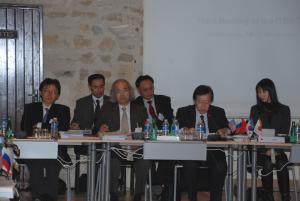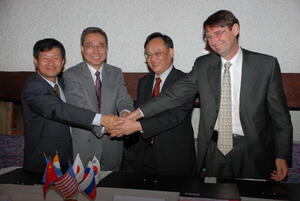ITER Council meets for third time
Last week, the ITER Council, the governing body of the ITER Organization, convened in Cadarache for its third meeting. The two-day conference brought together representatives from the governments of the seven ITER Members: China, the European Union, India, Japan, Korea, Russia and the United States. Strengthening coordination and better integrating the work of the ITER Organization and the Domestic Agencies was clearly a focal point on many elements of the agenda.
Another important issue was the outcome of the Briscoe Review Panel, an expert group on project management set up by the last ITER Council. The Panel had made recommendations for the establishment of a well-founded cost and schedule baseline as well as effective management systems. It recommended a detailed estimate based on a more integrated approach involving stronger cooperation between the ITER Organization and the Domestic Agencies. This higher level of integration is seen as a crucial step for moving the project forward, streamlining management and containing costs. "To keep momentum, ITER needs the collective efforts and continued support from its Members, laying the foundations for a new model of global scientific collaboration," the Director-General of the ITER Organization, Kaname Ikeda, said.
Implementing "integrated product teams" staffed by the ITER Organization and the Domestic Agencies, and transforming the regular conferences between the ITER management and the Domestic Agencies into an empowered Project Board were the two pillars of the idea. This step would allow it to take timely decisions in order to proceed with a cost conscious design and managing the distributed procurement process. In the recent Meeting of the Management Advisory Committee (MAC), the ITER Organization and the Domestic Agencies had jointly proposed the implementation of this scheme, rallying support from the members. So far the Council agreed to launch a trial phase with three integrated product teams, one each for the vacuum vessel, the blanket and the power supplies, and anticipates seeing the benefits before taking any further steps.
Progress was also made in regards to procuring critical parts of the ITER machine. At the meeting, five Procurement Arrangements totalling EUR 414.5 million were signed, involving the European, Japanese and Korean Domestic Agencies. "These signatures are essential milestones for the project and mark a substantial step forward towards construction," Ikeda stressed.
The Procurement Arrangements include the agreement to build two sections of the vacuum vessel and its equatorial and lower ports in Korea (see article below). The vacuum vessel agreement was signed by ITER Director-General Kaname Ikeda and the Director of the Korean Domestic Agency, Kijung Jung. Together with the Director of the Japanese Domestic Agency, Toshihide Tsunematsu, Ikeda then signed the procurement contracts for the manufacturing of 9 out of 19 toroidal field magnet windings and nine out of 19 toroidal field magnet structures in Japan. The agreement further allows for the construction of a winding facility for five of the six poloidal field coils on the ITER site. The coil winding building, financed by the European Union, was subject to another Procurement Arrangement countersigned by Didier Gambier, Director of the European Domestic Agency. Meanwhile the ITER Organization, the Domestic Agencies and the Members are working feverishly to finalize more in order to meet the target of 24 for this year.
The Council also approved the implementation of the Test Blanket Module Program into the ITER Agreement. These modules will allow testing of concepts for achieving self-sufficiency in tritium supply for future fusion power plants. The Council further accepted the ITER budget for the year 2009 and the staffing plan proposed by the ITER Organization, as well as the proposed changes to the staff regulations. For the first time, following the Cooperation Agreement between the ITER Organization and the International Atomic Energy Agency (IAEA) in October, Natesan Ramamoorthy, Director of the Divison of Physical and Chemical sciences at the IAEA, attended the ITER Council meeting as an Observer.
The Council re-elected Sir Chris Llewellyn Smith as the Chair and Academician Evgeny Velikhov as the Vice-Chair of the ITER Council, and reappointed Predhiman Kaw as the Chair and Yuanxi Wan as the Vice-Chair of the Science and Technology Advisory Committee (STAC), and Robert Iotti as the Chair and Gyung-Su Lee as the Vice-Chair of the Management Advisory Committee (MAC), to serve until the end of the calendar year 2009.
Read the press release in English and French.
Click here to read the European Commission Press Release.



